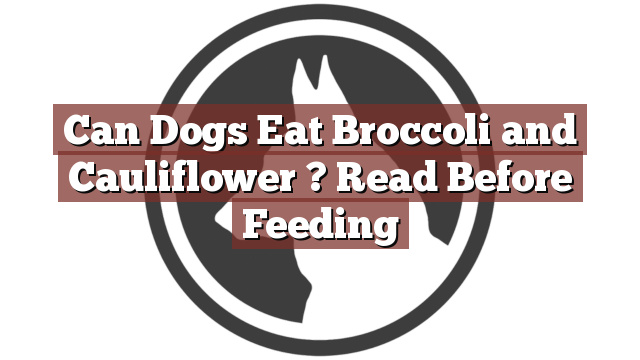Understanding Your Dog’s Dietary Needs
As a responsible dog owner, it is crucial to understand your furry friend’s dietary needs. Providing a balanced and nutritious diet is essential for their overall health and well-being. While dogs primarily thrive on a diet rich in protein, they can benefit from certain fruits and vegetables in moderation. However, it is important to know which ones are safe for them to consume. In this article, we will explore the question, "Can dogs eat broccoli and cauliflower?" and provide you with the necessary information before you consider feeding these vegetables to your beloved pet.
Can Dogs Eat Broccoli and Cauliflower? Read Before Feeding
Can dogs eat broccoli and cauliflower? The answer is yes, but with some precautions. Both broccoli and cauliflower are considered safe for dogs to eat in small amounts. These vegetables are packed with essential vitamins, minerals, and fiber that can be beneficial for your dog’s overall health. However, it is important to properly prepare and serve these vegetables to your dog to ensure their safety and to avoid any potential digestive issues.
Pros and Cons of Feeding Broccoli and Cauliflower to Dogs
Feeding broccoli and cauliflower to your dog can have its advantages and drawbacks. Let’s explore the pros and cons to help you make an informed decision:
Pros:
- Nutritional Benefits: Broccoli and cauliflower are low in calories and high in fiber, making them a healthy addition to your dog’s diet. These vegetables contain vitamins A, C, and K, as well as minerals such as potassium and folate.
- Antioxidant Properties: The antioxidants present in broccoli and cauliflower can help boost your dog’s immune system and reduce the risk of certain diseases.
- Digestive Aid: The high fiber content in these vegetables can aid in digestion and help regulate bowel movements.
Cons:
- Digestive Sensitivity: Some dogs may experience gas, bloating, or an upset stomach when consuming broccoli and cauliflower. It is important to introduce these vegetables gradually and monitor your dog’s reaction.
- Potential Choking Hazard: Broccoli and cauliflower florets can pose a choking hazard, especially for small dogs or those who gulp their food quickly. It is essential to chop these vegetables into small, manageable pieces before feeding them to your dog.
Conclusion: Considerations for Feeding Broccoli and Cauliflower to Your Dog
In conclusion, dogs can eat broccoli and cauliflower in moderation and when prepared appropriately. However, it is crucial to keep a few considerations in mind. Always introduce new foods gradually and monitor your dog for any adverse reactions. If your dog has a pre-existing digestive condition or is prone to gastrointestinal issues, it is advisable to consult with your veterinarian before adding these vegetables to their diet. Remember, a balanced and varied diet is key to keeping your furry companion healthy, so consider incorporating broccoli and cauliflower as an occasional treat alongside their regular dog food.
Thank you for taking the time to read through our exploration of [page_title]. As every dog lover knows, our furry friends have unique dietary needs and responses, often varying from one canine to another. This is why it's paramount to approach any changes in their diet with caution and knowledge.
Before introducing any new treats or making alterations to your dog's diet based on our insights, it's crucial to consult with a veterinarian about [page_title]. Their expertise ensures that the choices you make are well-suited to your particular pet's health and well-being.
Even seemingly harmless foods can sometimes lead to allergic reactions or digestive issues, which is why monitoring your dog after introducing any new food item is essential.
The content provided here on [page_title] is crafted with care, thorough research, and a genuine love for dogs. Nevertheless, it serves as a general guideline and should not be considered a substitute for professional veterinary advice.
Always prioritize the expert insights of your veterinarian, and remember that the health and happiness of your furry companion come first.
May your journey with your pet continue to be filled with joy, love, and safe culinary adventures. Happy reading, and even happier snacking for your canine friend!

